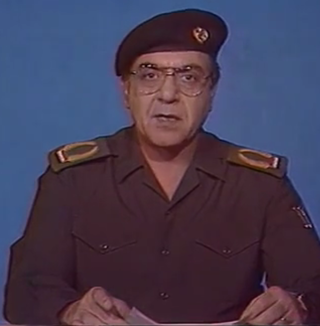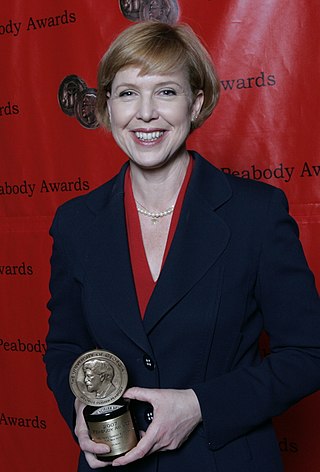Related Research Articles

Robert William Fisk was an English writer and journalist. He was critical of United States foreign policy in the Middle East, and the Israeli government's treatment of Palestinians.

Mohammed Saeed al-Sahhaf is an Iraqi former diplomat and politician. He served as Minister of Foreign Affairs from 1992 to 2001. He came to worldwide prominence around the 2003 invasion of Iraq, during which he was the Minister of Information under Iraqi President Saddam Hussein, acting as spokesman for the Arab Socialist Ba'ath Party and Saddam's government. He has also been nicknamed Baghdad Bob or Comical Ali for his notable and colorful television appearances as the Information Minister of Iraq.

David Jerome Bloom was an American television journalist until his sudden death in 2003 after a deep vein thrombosis (DVT) became a pulmonary embolism at the age of 39.

The 2003 invasion of Iraq had unprecedented US media coverage, especially cable news networks. US media was largely uncritical of the war, with many viewers falsely believing that Saddam Hussein and Iraq were involved with the 9/11 attacks. British media was more cautious in its coverage. The Qatari Al-Jazeera network was heavily critical of the war.
Anne Longworth Garrels was an American broadcast journalist who worked as a foreign correspondent for National Public Radio, as well as for ABC and NBC, and other media.

John Cody Fidler-Simpson is an English foreign correspondent who is currently the world affairs editor of BBC News. He has spent all his working life with the BBC, and has reported from more than 120 countries, including thirty war zones, and interviewed many world leaders. He was educated at Magdalene College, Cambridge, where he read English and was editor of Granta magazine.

Kathryn Adie is an English journalist. She was Chief News Correspondent for BBC News between 1989 and 2003, during which time she reported from war zones around the world.

Eason Jordan is an executive and entrepreneur who serves as the Rockefeller Foundation's Senior Vice President for Connected Leaders.
Richard Roth is an American journalist, a CNN correspondent who covers the United Nations. He was the host of Diplomatic License, a weekly program that was devoted to United Nations affairs. Roth is a CNN "original" — one of the first employees when the network launched in 1980. He has covered a wide range of stories over the last 25 years, from the 1989 Tiananmen Square protests to the fall of the Berlin Wall and the first Gulf War.

Kimberly Dozier is a contributor to CNN. She was previously a contributor to TIME Magazine and contributing writer for The Daily Beast and covered intelligence and counterterrorism for the Associated Press. Prior to that, she was a CBS News correspondent for 17 years, based mostly overseas. She was stationed in Baghdad as the chief reporter in Iraq for CBS News for nearly three years prior to being critically wounded on May 29, 2006. She was the 2014-2015 General Omar N. Bradley Chair in Strategic Leadership, at the Army War College, Penn State Law and Dickinson College.

Richard Engel is an American journalist and author who is the chief foreign correspondent for NBC News. He was assigned to that position on April 18, 2008, after serving as the network's Middle East correspondent and Beirut bureau chief. Before joining NBC in May 2003, Engel reported on the start of the 2003 war in Iraq for ABC News as a freelance journalist in Baghdad.
Matthew William Price is a British journalist who currently works as Chief Correspondent for the BBC Radio 4 Today programme.

Lourdes "Lulu" Garcia-Navarro is an American journalist who is an Opinion Audio podcast host for The New York Times. She was the host of National Public Radio's Weekend Edition Sunday from 2017 to 2021, when she left NPR after 17 years at the network.
James Allan Stuart Little is a Special Correspondent for BBC News, based at New Broadcasting House, London.

Richard Downes is an Irish broadcaster and journalist. He has worked for the Press Association, Reuters, the Financial Times, the BBC and RTÉ. He was one of the presenters of Morning Ireland on RTÉ Radio 1 from 2002 until 2010 and was Washington Correspondent for RTÉ News from 2010 until 2013.
Christian James Fraser is a British journalist, newsreader, writer and broadcaster, specialising in news and current affairs, who is a BBC News senior news correspondent and chief presenter. He presents The Context.

Leila Fadel is a Lebanese American journalist and the cohost of National Public Radio's Morning Edition, a role she assumed in 2022. She was previously the network's Cairo bureau chief. Fadel has chiefly worked in the Middle East, and received a George Polk Award for her coverage of the Iraq War. She is also known for her coverage of the Arab Spring.
The Persian Gulf War, codenamed Operation Desert Storm and commonly referred to as the Gulf War, was a war waged by a United Nations-authorized coalition force from 34 nations led by the United States against Iraq in response to Iraq's invasion and annexation of Kuwait. Media coverage of the Gulf War was significant for many reasons including CNN's live reporting from a Baghdad hotel, alternative and international coverage, and the use of images.
Timothy Henry Franks is a British journalist and radio presenter who presents Newshour, the flagship news and current affairs programme on BBC World Service radio. He also, from time to time, presents Hardtalk on BBC World News, and documentaries across BBC TV and radio. He was previously an award-winning foreign correspondent for the BBC.
References
- 1 2 3 4 5 6 7 8 9 10 11 12 13 14 15 "Bob Simpson". The Telegraph. 28 July 2006. Archived from the original on 4 June 2011. Retrieved 4 September 2011.
- 1 2 3 4 5 6 7 8 9 10 11 12 13 14 15 16 17 Peter Ruff (31 July 2006). "Obituary : Bob Simpson". The Guardian. Retrieved 4 September 2011.
- 1 2 3 4 5 6 7 8 9 10 11 Allan Little (29 July 2006). "Bob Simpson". The Independent. Archived from the original on 26 November 2009. Retrieved 4 September 2011.
- 1 2 "Bob Simpson dies". Press Gazette. 4 August 2006. Archived from the original on 21 April 2013. Retrieved 4 September 2011.
- 1 2 3 "Retired BBC reporter dies at home". BBC News. 25 July 2006. Retrieved 4 September 2011.
- ↑ "Sound Matters – Five Live – the War of Broadcasting House – a morality story". BBC News. Retrieved 7 October 2020.